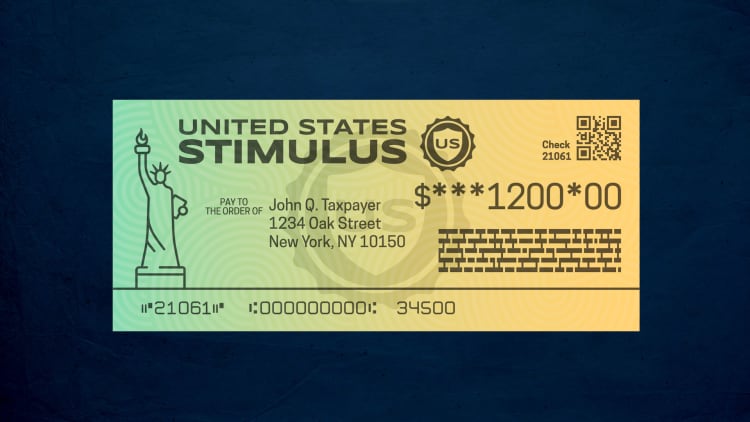If you're still waiting for your coronavirus stimulus payment, a paper check could be in the mail.
The U.S. government is issuing one-time payments of up to $1,200 per individual and $2,400 per married couple, as well as $500 for children under 17, provided families are under certain income thresholds.
More than 80 million payments were made directly to bank accounts starting last week. Meanwhile, at least 171 million total payments are still expected to go out, including paper checks through the mail.
"We started sending out the checks," Treasury Secretary Steve Mnuchin said during a White House press conference on Tuesday.
"We're also going to be supplementing our capability and sending prepaid debit cards so we can get money out quickly to people," Mnuchin said.
A recent Congressional timeline estimates that 101 million payments will be made by paper check unless the government receives direct deposit information on time. Individuals may be able to enter their bank account information on the Get My Payment website.
Paper checks are slated to be issued at a rate of 5 million per week, starting with the lowest income individuals and families. It will take up to 20 weeks — or five months — for all of those payments to be deployed, Congress estimates.
Watch out for fraud
While many will be eager to receive their checks, they should be on the lookout for fraud.
This week, the Secret Service and Treasury Department teamed up to warn Americans about counterfeit U.S. Treasury checks that could be circulating.
There are certain things to look for to make sure a paper check you receive is real. That includes a new seal that appears to the right of the Statue of Liberty that says, "Bureau of the Fiscal Service," among other security features.
Be aware of scammers who might try to take advantage of you at this time, said Steve Kenneally, senior vice president of payments at the American Bankers Association.

That could include someone asking you to deposit their check into your bank account in exchange for cash. Whether it's a fraudulent check or a real one that has been altered, ultimately the bank account owner will face consequences.
You also want to be sure to guard personal information that could be used to unlock prepaid debit cards, if the government decides to send stimulus payments in that form.
"It all comes down to keep your personal information to yourself," Kenneally said. "If you're expecting a check, but haven't received it yet, go to the IRS web portal."
Where to go for more information
The IRS has a website specifically dedicated to information on the stimulus payments. In addition, the Get My Payment portal will let you enter your personal bank account information so that you can receive the funds electronically instead of by mail. It also lets you check the status of your payment.
Many users have reported delays in using that website. But it can be worth it to try to expedite your receipt of the money, Kenneally said.
"If you have the opportunity to receive your payment two months faster by getting it electronically, it's worth trying to plod your way through that," Kenneally said.
More from Personal Finance:
Timeline shows when all coronavirus stimulus payments should arrive
How experts say this millennial should spend her stimulus check
What to do with the money if you got a Paycheck Protection Loan
Be sure that you are using the verified IRS website. Do not respond to emails allegedly coming from the IRS, or click on any links included in those messages.
The IRS will mail a letter to the address of the stimulus payment recipient 15 days after the payment is made.
If you receive that letter, but did not receive your payment, you should report it to the IRS.



